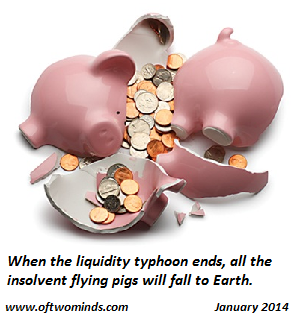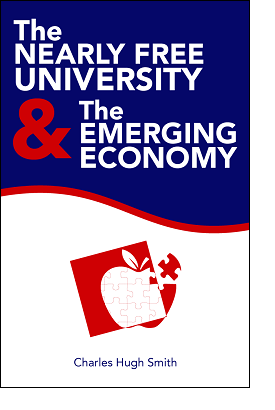In a Typhoon, Even Pigs Can Fly (for a while)
Here's the global financial crisis in a nutshell: access to easy credit can solve a temporary liquidity problem, but it can't increase the value of collateral or generate income.

The Chinese culture has a wonderful vocabulary of colorful analogies and metaphors, and today's title refers to the typhoon of liquidity (freely available credit) that has flooded the global economy for the past five years.
The source of the phrase is Liu Chuanzhi, the Chairman of Lenovo and the iconic figure of Chinese manufacturing. When asked a few years ago why 60% of Lenovo Group’s profit came from asset investment and only 40% came from manufacturing. He said “when the typhoons come, even a pig can fly in the sky. Everybody is profiteering from this. Why can’t we?”
The typhoon in this case is China's credit/liquidity-driven real estate speculative frenzy, in which the only losers are those who don't borrow to the hilt in the shadow banking system and buy, buy, buy empty flats in vacant buildings.
The critical distinction to make about typhoons of credit-driven speculation (in China, Japan, the U.S., Europe, etc.) is between liquidity and valuation.
Let's take a household as an example to explain the difference. Say the household owns a $300,000 house with a $150,000 mortgage. The household has home equity of $150,000.
Let's say one of the household loses their job and the sole remaining income is not enough to pay the monthly bills. This is a liquidity crisis. The household could borrow money based on the collateral of the home equity to tide them over until the second worker finds a new job.
A valuation crisis is different: let's say the household decides to sell the house and discovers the market value is only $150,000--the same as the mortgage. After deducting the real estate transaction costs, the household has negative equity. So instead, the owners claim the house is worth $250,000 and try to get a home equity line of credit to solve their income/liquidity crisis.
Here's the global financial crisis in a nutshell: access to easy credit can solve a temporary liquidity problem, but it can't increase the value of collateral or generate income. The owner can misrepresent the value of the asset to borrow money based on phantom collateral, but that doesn't change the market value of the underlying asset or increase the income needed to make loan payments.
Simply put, credit/liquidity cannot solve valuation/collateral crises. Correspondent J.B. recently addressed this issue:
"RE: accounting and real life. Sometimes they differ but over the long run they always synch up. For instance let's say a bank has a lot of quality assets but a liquidity issue. It will take that good paper to the Fed to get liquidity for the bank to get through the hard time (no write down required and it works out). On the other hand if the bank has a bunch of bad assets, it now has a solvency issue and not a liquidity issue (i.e. not marking to market does not agree with reality). Sure if CRE goes bad it can postpone marking it to market for a while but soon it has no cashflow and accounting does not matter because it cannot pay its bills, payroll or redeem demand deposits. The failure to properly mark assets to market will not save it and ultimately accounting and reality will re-synch."The world's central banks and governments have tried for the past five years to fix a valuation/collateral/income crisis with liquidity. No wonder they've failed--enabling insolvent owners to borrow more money doesn't make the borrowers any less insolvent.
Once the liquidity typhoon dies down, the insolvent pigs will plummet back to earth. That's what we're seeing in the periphery economies and shadow banking systems around the world.
The Nearly Free University and The Emerging Economy:
The Revolution in Higher Education
Reconnecting higher education, livelihoods and the economyWith the soaring cost of higher education, has the value a college degree been turned upside down? College tuition and fees are up 1000% since 1980. Half of all recent college graduates are jobless or underemployed, revealing a deep disconnect between higher education and the job market.
It is no surprise everyone is asking: Where is the return on investment? Is the assumption that higher education returns greater prosperity no longer true? And if this is the case, how does this impact you, your children and grandchildren?

We must thoroughly understand the twin revolutions now fundamentally changing our world: The true cost of higher education and an economy that seems to re-shape itself minute to minute.
The Nearly Free University and the Emerging Economy clearly describes the underlying dynamics at work - and, more importantly, lays out a new low-cost model for higher education: how digital technology is enabling a revolution in higher education that dramatically lowers costs while expanding the opportunities for students of all ages.
The Nearly Free University and the Emerging Economy provides clarity and optimism in a period of the greatest change our educational systems and society have seen, and offers everyone the tools needed to prosper in the Emerging Economy.
Read Chapter 1/Table of Contents
print ($20) Kindle ($9.95)
Things are falling apart--that is obvious. But why are they falling apart? The reasons are complex and global. Our economy and society have structural problems that cannot be solved by adding debt to debt. We are becoming poorer, not just from financial over-reach, but from fundamental forces that are not easy to identify. We will cover the five core reasons why things are falling apart:
 1. Debt and financialization
1. Debt and financialization2. Crony capitalism
3. Diminishing returns
4. Centralization
5. Technological, financial and demographic changes in our economy
Complex systems weakened by diminishing returns collapse under their own weight and are replaced by systems that are simpler, faster and affordable. If we cling to the old ways, our system will disintegrate. If we want sustainable prosperity rather than collapse, we must embrace a new model that is Decentralized, Adaptive, Transparent and Accountable (DATA).
We are not powerless. Once we accept responsibility, we become powerful.
Read the Introduction/Table of ContentsKindle: $9.95 print: $24
| Thank you, Susan V. ($20), for your most generous contribution to this site-- I am greatly honored by your support and readership. |
























